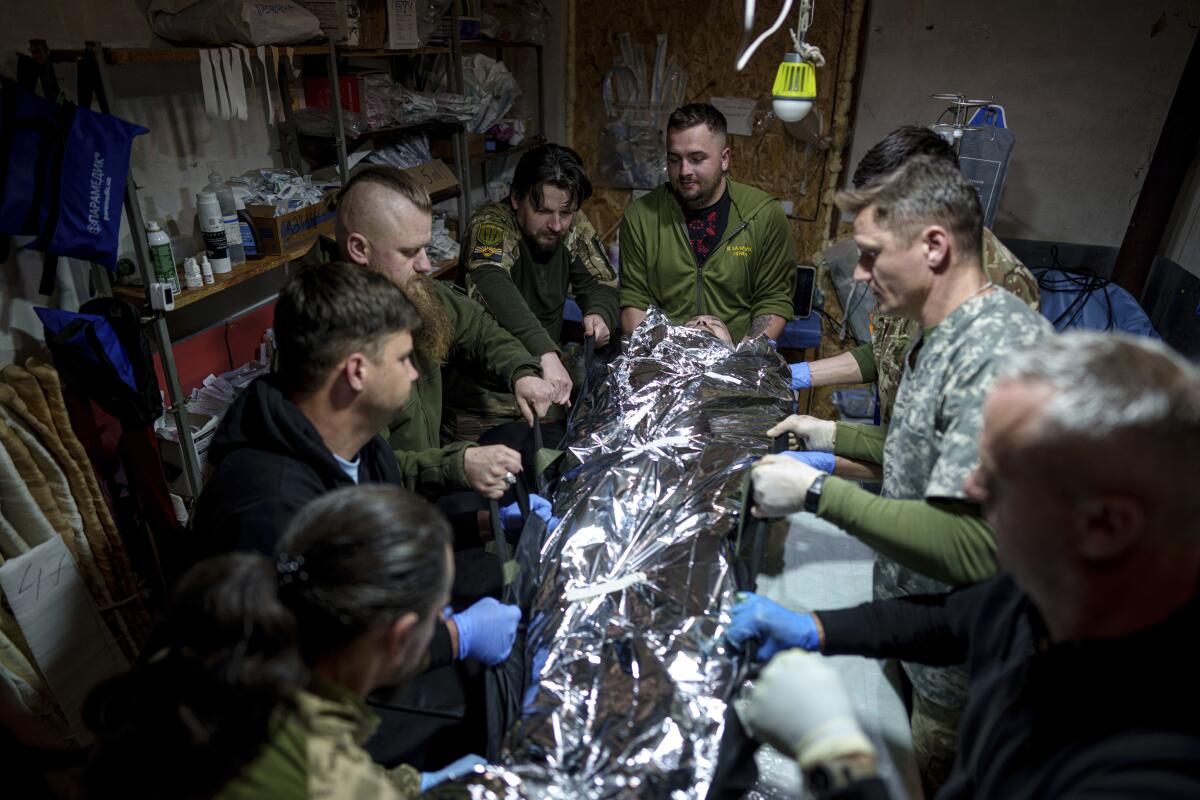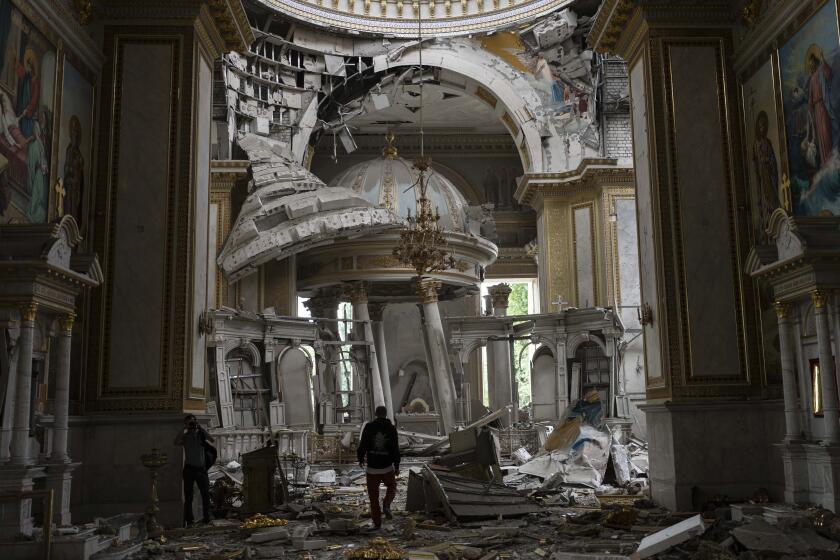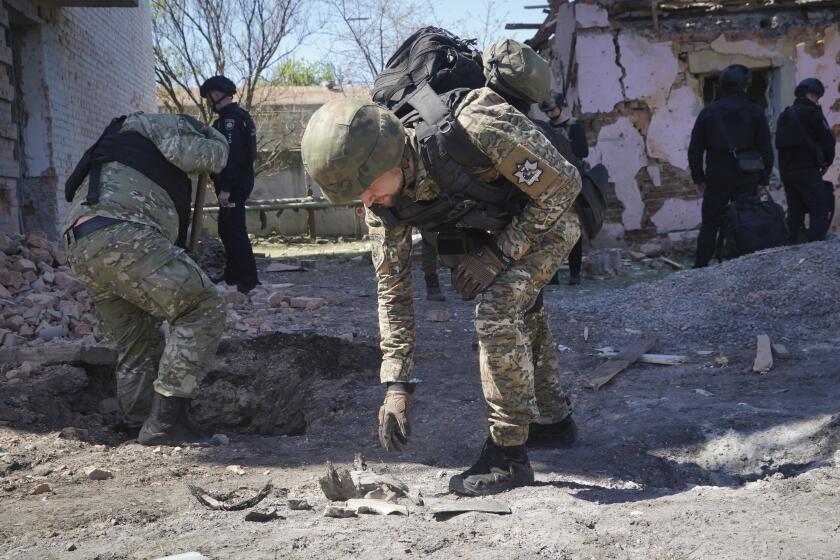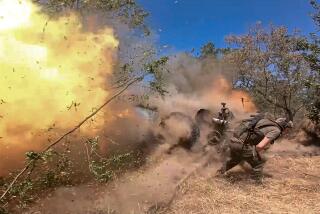Only a few hundred remain in Ukrainian border town as fierce battles rage

KYIV, Ukraine — Only a few hundred residents remain in the embattled town of Vovchansk in northeast Ukraine, where Kyiv’s troops are locked in intense battles with the Russian army, according to local officials Monday.
The town, whose prewar population of 17,000 had dwindled to just 2,500 before Russia renewed its ground assault last week, has emerged as a focus point as pitched battles engulf the Kharkiv and Donetsk regions.
Ukrainian local officials said they feared Vovchansk’s fate may mirror that of Bakhmut and Avdiivka, Ukrainian cities where fierce fighting and scorched earth tactics forced Ukrainian withdrawals. Only 200-300 people remain in the town, Kharkiv regional governor Oleh Sinegubov said, as Moscow’s troops advance in an effort to surround it from three directions.
Poorly built fortifications and enduring ammunition shortages enabled Russia’s sweeping advance in the area last week, local officials and soldiers said.
Could Ukraine lose the war? Once nearly taboo, the question hovers in Kyiv, but Ukrainians believe they must fight for their lives against Putin’s troops.
In the span of two days, Moscow has captured some 40 square miles that encompass at least seven villages, most of them already depopulated, according to the open source monitoring project DeepState. It is a significant advance that could pin Ukrainian forces in the northeast while heavy fighting continues in the Donetsk region.
On Monday, Ukrainian troops were still locked in pitched battles in both regions, President Volodymyr Zelensky said. Fighting is taking place near the border in eastern and northeastern Ukraine as outgunned and outnumbered Ukrainian soldiers try to hold back a significant Russian ground offensive.
“Defensive battles are ongoing, fierce battles, on a large part of our border area,” Zelensky said in his nightly video address Sunday.
The Kremlin’s forces are aiming to exploit Ukrainian weaknesses before a big batch of new military aid for Kyiv from the U.S. and European partners arrives on the battlefield in the coming weeks and months, analysts say. That makes this period a window of opportunity for Moscow and one of the most dangerous for Kyiv in the two-year war, they say. It is unclear what of the promised aid has arrived to Ukraine.
Ukraine’s port of Odesa is a key Russian target, endangering the city’s UNESCO-designated historic center and challenging citizens to keep their sense of humor.
The new Russian push in the northeastern Kharkiv region, along with the ongoing drive into the eastern Donetsk region, comes after months when the roughly 620-mile front line barely budged. In the meantime, both sides have used long-range strikes to pursue what became largely a war of attrition.
Ukraine’s general staff said late Sunday that Russian forces had conducted at least 22 attacks over the previous 24 hours in two parts of the Kharkiv region and had “tactical success.” The statement did not elaborate.
The Kharkiv incursion serves likely three purposes for Russia. First, the northeast operation will pin Ukrainian forces in the region and potentially draw in precious reserves away from heavy battles in the Avdiivka and Chasiv Yar areas of the Donetsk region, where Russia’s advance has been far more significant and strategically important.
Zelensky said fighting in the Donetsk area is “no less intense” than in Kharkiv. He said the Kremlin aimed to “spread our forces thin” by opening a second active front in Kharkiv.
In a Ukrainian village, a woman wants only one thing: to find her husband, who disappeared shortly after Russia’s war on Ukraine started two years ago.
Zelensky described the area around Pokrovsk region, just inside the Ukrainian border in Donetsk, as “the most difficult.”
Pokrovsk was a town of around 60,000 people before the war and was until recently a two-hour drive from the front line. Now it is less than half that.
The capture of the Donetsk city of Avdiivka in February opened a door for the Kremlin’s troops to push westward, deeper into Donetsk. Russia illegally annexed Donetsk and three other regions in 2022 shortly after it invaded Ukraine, and taking control of all of Donetsk is one of the Kremlin’s main war goals.
Second, if Ukraine isn’t able to halt Moscow’s advance, it could create future conditions for a possible attack on Kharkiv City, Ukraine’s second largest.
Finally, it could create a “buffer zone” to protect Belgorod, where frequent Ukrainian attacks have embarrassed the Kremlin. In March, Russia announced plans to evacuate about 9,000 children from the Belgorod region because it was being shelled continuously.
Russian emergency services on Monday finished clearing the rubble in the region’s capital city of Belgorod, where a section of a residential building collapsed following what authorities said was Ukrainian shelling.
Ukraine is trying to determine if Russia’s ground attack in Kharkiv is opening a new war front — or meant to divert overstretched Ukrainian troops?
Fifteen bodies were pulled from the rubble, Belgorod regional Gov. Vyacheslav Gladkov said, and 27 other people were wounded.
Another three people in the city of Belgorod were killed by shelling late Sunday, he said.
Yevgeny Poddubny, a usually well-connected military correspondent for Russia’s state TV corporation VGTRK, said in a recent Telegram post that the Kharkiv assault marked the beginning of “a new phase.”
“We’re pushing the enemy back from the border, destroying the enemy in order to deprive the Kyiv regime of the opportunity to use relatively cheap rockets to attack Belgorod,” he said.
Novikov writes for the Associated Press.
More to Read
Sign up for Essential California
The most important California stories and recommendations in your inbox every morning.
You may occasionally receive promotional content from the Los Angeles Times.














